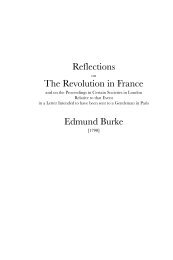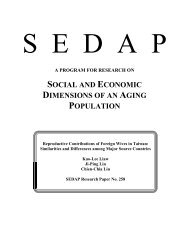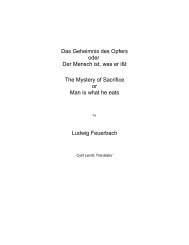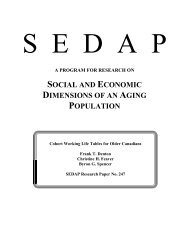12/<strong>John</strong> <strong>Locke</strong>eunuchs much in use in old times, O. p. 155. Law is nothing else but thewill <strong>of</strong> him that hath the power <strong>of</strong> the supreme father, O. p. 223. It wasGod’s ordinance that the supremacy should be unlimited in Adam, andas large as all the acts <strong>of</strong> his will; and as in him, so in all others that havesupreme power,” O. p. 245.§9. I have been fain to trouble my reader with these several quotationsin our A.’s own words, that in them might be seen his own description<strong>of</strong> his fatherly authority, as it lies scattered up and down in hiswritings, which he supposes was first vested in Adam, and by rightbelongs to all princes ever since. This fatherly authority there, or right<strong>of</strong> fatherhood, in our A.’s sense, is a divine unalterable right <strong>of</strong> sovereignty,whereby a father or a prince hath an absolute, arbitrary, unlimited,and unlimitable power over the lives, liberties, and estates <strong>of</strong> hischildren and subjects; so that he may take or alienate their estates, sell,castrate, or use their persons as he pleases, they being all his slaves, andhe lord or proprietor <strong>of</strong> every thing, and his unbounded will their law.§10. Our A. having placed such a mighty power in Adam, and uponthat supposition founded all government and all power <strong>of</strong> princes, it isreasonable to expect that he should have proved this with argumentsclear and evident, suitable to the weightiness <strong>of</strong> the cause. That sincemen had nothing else left them, they might in slavery have such undeniablepro<strong>of</strong>s <strong>of</strong> its necessity, that their consciences might be convinced,and oblige them to submit peaceably to that absolute dominion, whichtheir governors had a right to exercise over them. Without this, whatgood could our A. do, or pretend to do, by erecting such an unlimitedpower, but flatter the natural vanity and ambition <strong>of</strong> men, too apt <strong>of</strong>itself to grow and increase with the possession <strong>of</strong> any power? And bypersuading those, who, by the consent <strong>of</strong> their fellow-men, are advancedto great but limited degrees <strong>of</strong> it, that by that part which is given them,they have a right to all that was not so; and therefore may do what theyplease, because they have authority to do more than others, and so temptthem to do what is neither for their own, nor the good <strong>of</strong> those undertheir care; whereby great mischief cannot but follow.§11. The sovereignty <strong>of</strong> Adam being that on which, as a sure basis,our A. builds his mighty absolute monarchy, I expected, that, in hisPatriarcha, this his main supposition would have been proved and establishedwith all that evidence <strong>of</strong> arguments that such a fundamentaltenet required; and that this, which the great stress <strong>of</strong> the business depends,would have been made out, with reasons sufficient to justify the
<strong>Two</strong> <strong>Treatises</strong> <strong>of</strong> <strong>Government</strong>/13confidence with which it was assumed. But, In all that treatise, I couldfind very little tending that way; the thing is there so taken for granted,without pro<strong>of</strong>, that I could scarce believe myself, when, upon attentivereading that treatise, I found there so mighty a structure raised upon thebare supposition <strong>of</strong> this foundation. For it is scarce credible, that in adiscourse, where he pretends to confute the erroneous principle <strong>of</strong> man’snatural freedom, he should do it by a bare supposition <strong>of</strong> Adam’s authority,without <strong>of</strong>fering any pro<strong>of</strong> for that authority. Indeed, he confidentlysays, that Adam had “royal authority, p. 12 and 13. Absolutelordship and dominion <strong>of</strong> life and death, p. 13. An universal monarchy,p. 83. Absolute power <strong>of</strong> life and death,” p. 35. He is very frequent insuch assertions; but, what is strange, in all his whole Patriarcha, I findnot one presence <strong>of</strong> a reason to establish this his great foundation <strong>of</strong>government; not any thing that looks like an argument, but these words:“To confirm this natural right <strong>of</strong> regal power, we find in the decalogue,that the law which enjoins obedience to kings, is delivered ill the terms,Honour thy father; as if all power were originally in the father.” Andwhy may I not add as well, that in the decalogue the law that enjoinsobedience to queens, is delivered in the terms <strong>of</strong> “Honour thy mother,”as if all power were originally in the mother? The argument, as sir Robertputs it, will hold as well for one as the other; but <strong>of</strong> this more in itsdue place.§12. All that I take notice <strong>of</strong> here is, that this is all our A. says, inthis first, or any <strong>of</strong> the following chapters, to prove the absolute power<strong>of</strong> Adam, which is his great principle: and yet, as if he had there settledit upon sure demonstration, he begins his second chapter with thesewords, “By conferring these pro<strong>of</strong>s and reasons, drawn from the authority<strong>of</strong> the Scripture.” Where those pro<strong>of</strong>s and reasons for Adam’ssovereignty are, bating that <strong>of</strong> Honour thy father, above-mentioned, Iconfess, I cannot find; unless what he says, p. 11, “In these words wehave an evident confession,” viz., <strong>of</strong> Bellarmine, “that creation mademan prince <strong>of</strong> his posterity,” must be taken for pro<strong>of</strong>s and reasons drawnfrom Scripture, or for any sort <strong>of</strong> pro<strong>of</strong> at all: though from thence, by anew way <strong>of</strong> inference, in the words immediately following, he concludesthe royal authority <strong>of</strong> Adam sufficiently settled in him.§13. If he has in that chapter, or any where in the whole treatise,given any other pro<strong>of</strong>s <strong>of</strong> Adam’s royal authority, other than by <strong>of</strong>tenrepeating it, which, among some men, goes for argument, I desire anybody for him to show me the place and page, that I may be convinced <strong>of</strong>
- Page 1 and 2: Two TreatisesofGovernmentIn the For
- Page 3 and 4: ContentsThe Preface ...............
- Page 5 and 6: The PrefaceReader.Thou hast here th
- Page 7 and 8: The False Principles and Foundation
- Page 9 and 10: Two Treatises of Government/9with S
- Page 11: Two Treatises of Government/11fathe
- Page 15 and 16: Two Treatises of Government/15thing
- Page 17 and 18: Two Treatises of Government/17§18.
- Page 19 and 20: Two Treatises of Government/19Chapt
- Page 21 and 22: Two Treatises of Government/21Adam,
- Page 23 and 24: Two Treatises of Government/23any o
- Page 25 and 26: Two Treatises of Government/25sons
- Page 27 and 28: Two Treatises of Government/27gated
- Page 29 and 30: Two Treatises of Government/29gave
- Page 31 and 32: Two Treatises of Government/31porti
- Page 33 and 34: Two Treatises of Government/33earth
- Page 35 and 36: Two Treatises of Government/35power
- Page 37 and 38: Two Treatises of Government/37are,
- Page 39 and 40: Two Treatises of Government/39the m
- Page 41 and 42: Two Treatises of Government/41autho
- Page 43 and 44: Two Treatises of Government/43prete
- Page 45 and 46: Two Treatises of Government/45tion
- Page 47 and 48: Two Treatises of Government/47frail
- Page 49 and 50: Two Treatises of Government/49accor
- Page 51 and 52: Two Treatises of Government/51”th
- Page 53 and 54: Two Treatises of Government/53posse
- Page 55 and 56: Two Treatises of Government/55the o
- Page 57 and 58: Two Treatises of Government/57world
- Page 59 and 60: Two Treatises of Government/59befor
- Page 61 and 62: Two Treatises of Government/61would
- Page 63 and 64:
Two Treatises of Government/63conve
- Page 65 and 66:
Two Treatises of Government/65fathe
- Page 67 and 68:
Two Treatises of Government/67estat
- Page 69 and 70:
Two Treatises of Government/69what
- Page 71 and 72:
Two Treatises of Government/71paren
- Page 73 and 74:
Two Treatises of Government/73had a
- Page 75 and 76:
Two Treatises of Government/75§115
- Page 77 and 78:
Two Treatises of Government/772. Be
- Page 79 and 80:
Two Treatises of Government/79is he
- Page 81 and 82:
Two Treatises of Government/81absol
- Page 83 and 84:
Two Treatises of Government/83“Th
- Page 85 and 86:
Two Treatises of Government/85power
- Page 87 and 88:
Two Treatises of Government/87bough
- Page 89 and 90:
Two Treatises of Government/89but t
- Page 91 and 92:
Two Treatises of Government/91nobod
- Page 93 and 94:
Two Treatises of Government/93Scrip
- Page 95 and 96:
Two Treatises of Government/95else
- Page 97 and 98:
Two Treatises of Government/97whils
- Page 99 and 100:
Two Treatises of Government/99offer
- Page 101 and 102:
Two Treatises of Government/101gove
- Page 103 and 104:
Two Treatises of Government/103will
- Page 105 and 106:
Concerning the True Original Extent
- Page 107 and 108:
Two Treatises of Government/107less
- Page 109 and 110:
Two Treatises of Government/109over
- Page 111 and 112:
Two Treatises of Government/111the
- Page 113 and 114:
Two Treatises of Government/113belo
- Page 115 and 116:
Two Treatises of Government/115the
- Page 117 and 118:
Two Treatises of Government/117the
- Page 119 and 120:
Two Treatises of Government/119comp
- Page 121 and 122:
Two Treatises of Government/121conv
- Page 123 and 124:
Two Treatises of Government/12343.
- Page 125 and 126:
Two Treatises of Government/125or a
- Page 127 and 128:
Two Treatises of Government/127into
- Page 129 and 130:
Two Treatises of Government/129his
- Page 131 and 132:
Two Treatises of Government/131sens
- Page 133 and 134:
Two Treatises of Government/133givi
- Page 135 and 136:
Two Treatises of Government/13571.
- Page 137 and 138:
Two Treatises of Government/137cond
- Page 139 and 140:
Two Treatises of Government/139fema
- Page 141 and 142:
Two Treatises of Government/141to t
- Page 143 and 144:
Two Treatises of Government/143rate
- Page 145 and 146:
Two Treatises of Government/145of l
- Page 147 and 148:
Two Treatises of Government/147any
- Page 149 and 150:
Two Treatises of Government/149ment
- Page 151 and 152:
Two Treatises of Government/151in s
- Page 153 and 154:
Two Treatises of Government/153whol
- Page 155 and 156:
Two Treatises of Government/155doub
- Page 157 and 158:
Two Treatises of Government/157ance
- Page 159 and 160:
Two Treatises of Government/159Chap
- Page 161 and 162:
Two Treatises of Government/161from
- Page 163 and 164:
Two Treatises of Government/163whic
- Page 165 and 166:
Two Treatises of Government/165his
- Page 167 and 168:
Two Treatises of Government/167he p
- Page 169 and 170:
Two Treatises of Government/169well
- Page 171 and 172:
Two Treatises of Government/171tion
- Page 173 and 174:
Two Treatises of Government/173of t
- Page 175 and 176:
Two Treatises of Government/175same
- Page 177 and 178:
Two Treatises of Government/177long
- Page 179 and 180:
Two Treatises of Government/179and
- Page 181 and 182:
Two Treatises of Government/181whic
- Page 183 and 184:
Two Treatises of Government/183seek
- Page 185 and 186:
Two Treatises of Government/185one
- Page 187 and 188:
Two Treatises of Government/187and
- Page 189 and 190:
Two Treatises of Government/189190.
- Page 191 and 192:
Two Treatises of Government/191selv
- Page 193 and 194:
Two Treatises of Government/193expr
- Page 195 and 196:
Two Treatises of Government/195inco
- Page 197 and 198:
Two Treatises of Government/197vati
- Page 199 and 200:
Two Treatises of Government/199have
- Page 201 and 202:
Two Treatises of Government/201ment
- Page 203 and 204:
Two Treatises of Government/203comp
- Page 205 and 206:
Two Treatises of Government/205can,
- Page 207 and 208:
Two Treatises of Government/207deni
- Page 209 and 210:
Two Treatises of Government/209reas
- Page 211 and 212:
Two Treatises of Government/211had
- Page 213 and 214:
Two Treatises of Government/213deci
- Page 215 and 216:
Two Treatises of Government/215less








